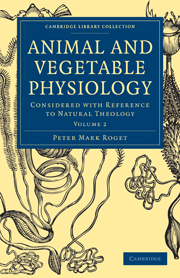Book contents
- Frontmatter
- Contents
- PART II THE VITAL FUNCTIONS
- PART III THE SENSORIAL FUNCTIONS
- CHAPTER I SENSATION
- CHAPTER II TOUCH
- CHAPTER III TASTE
- CHAPTER IV SMELL
- CHAPTER V HEARING
- CHAPTER VI VISION
- CHAPTER VII PERCEPTION
- CHAPTER VIII COMPARATIVE PHYSIOLOGY OF THE NERVOUS SYSTEM
- PART IV THE REPRODUCTIVE FUNCTIONS
- INDEX
CHAPTER VI - VISION
Published online by Cambridge University Press: 05 October 2010
- Frontmatter
- Contents
- PART II THE VITAL FUNCTIONS
- PART III THE SENSORIAL FUNCTIONS
- CHAPTER I SENSATION
- CHAPTER II TOUCH
- CHAPTER III TASTE
- CHAPTER IV SMELL
- CHAPTER V HEARING
- CHAPTER VI VISION
- CHAPTER VII PERCEPTION
- CHAPTER VIII COMPARATIVE PHYSIOLOGY OF THE NERVOUS SYSTEM
- PART IV THE REPRODUCTIVE FUNCTIONS
- INDEX
Summary
Object of the Sense of Vision.
To those who study nature with a view to the discovery of final causes, no subject can be more interesting or instructive than the physiology of Vision, the most refined and most admirable of all our senses. However well we may be acquainted with the construction of any particular part of the animal frame, it is evident that we can never form a correct estimate of the excellence of its mechanism, unless we have also a knowledge of the purposes to be answered by it, and of the means by which those purposes can be accomplished. Innumerable are the works of creation, the art and contrivance of which we are incompetent to understand, because we perceive only the ultimate effects, and remain ignorant of the operations by which those effects are produced. In attempting to investigate these obscure functions of the animal or vegetable economy, we might fancy ourselves engaged in the perusal of a volume, written in some unknown language, where we have penetrated the meaning of a few words and sentences, sufficient to show us that the whole is pregnant with the deepest thought, and conveys a tale of surpassing interest and wonder, but where we are left to gather the sense of connecting passages by the guidance of remote analogies or vague conjecture.
- Type
- Chapter
- Information
- Animal and Vegetable PhysiologyConsidered with Reference to Natural Theology, pp. 444 - 507Publisher: Cambridge University PressPrint publication year: 2009First published in: 1834



